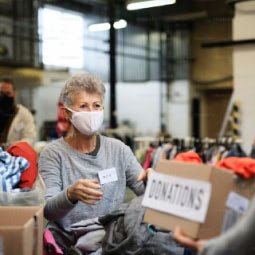By Dada Ahmed in Lokoja
In a heartfelt display of religious harmony in the face of economic hardships, some Muslim faithful in Lokoja, Kogi State, North Central Nigeria, shared festive meals with their Christian neighbors during the Eid-el-Kabir celebrations.
Our correspondent in Lokoja observed on Friday that, both before and after the special Eid prayers held at various prayer grounds, Muslim children were seen delivering meals to Christian families, acting on the instructions of their parents.
One such act of kindness was witnessed at Gadumo Quarters, where the family of Mrs. S. Aliyu extended meals to some Christian neighbors.
Speaking to our reporter, Mrs. Amina Aliyu acknowledged that although the country’s harsh economic conditions limited her ability to do more, she felt compelled to maintain the tradition of sharing during Sallah.
“Even in tough times, we must still show love to our neighbors, regardless of their faith,” she said.
Those who commented on the development described her action as a reflection of a growing call for religious tolerance and peaceful coexistence in Nigeria.
By taking deliberate steps to include Christians in the joy of the Islamic festival, Mrs. Aliyu and others like her are helping to bridge divides and foster a spirit of unity in their communities.
Such small but meaningful gestures, especially during major religious celebrations, play a crucial role in reinforcing the values of empathy, respect, and national cohesion.
In a country as religiously diverse as Nigeria, interfaith harmony remains a vital pillar for peaceful coexistence and national progress.
Actions such as Muslims sharing Sallah meals with Christians, as witnessed in parts of Lokoja during the recent Eid-el-Kabir celebration, are powerful demonstrations of this spirit.
These simple yet meaningful gestures help reduce religious tension, discourage violence, and promote a more tolerant society.
Beyond fostering peace, interfaith relationships strengthen the bond among citizens and reinforce national unity.
When people of different faiths interact positively, especially during significant religious celebrations like Sallah and Christmas, they build a shared identity that transcends religious affiliations.
These interactions remind Nigerians that despite their differences, they are one people with a common destiny. Such unity is critical for the country’s political stability, economic development and social cohension.
Moreover, interfaith harmony nurtures mutual respect, understanding, and community resilience. When Muslims and Christians celebrate together, they break down stereotypes and foster empathy.
Stronger communities emerge from such relationships, where cooperation in addressing issues like security, education, and healthcare becomes easier and more effective.
Inclusive participation in communal life ensures no group is left behind or marginalized due to their faith.
Perhaps most importantly, these gestures set positive examples for future generations. Children who witness their parents extend kindness across religious lines grow up with values of tolerance, compassion, and acceptance. This helps break the cycle of division and promotes a more morally upright society.
In the long run, building interfaith bridges, as demonstrated by citizens like Mrs. Aliyu, is not just commendable,it is essential for the sustainable peace and unity Nigeria desperately needs.
– Source: The Reporters.









